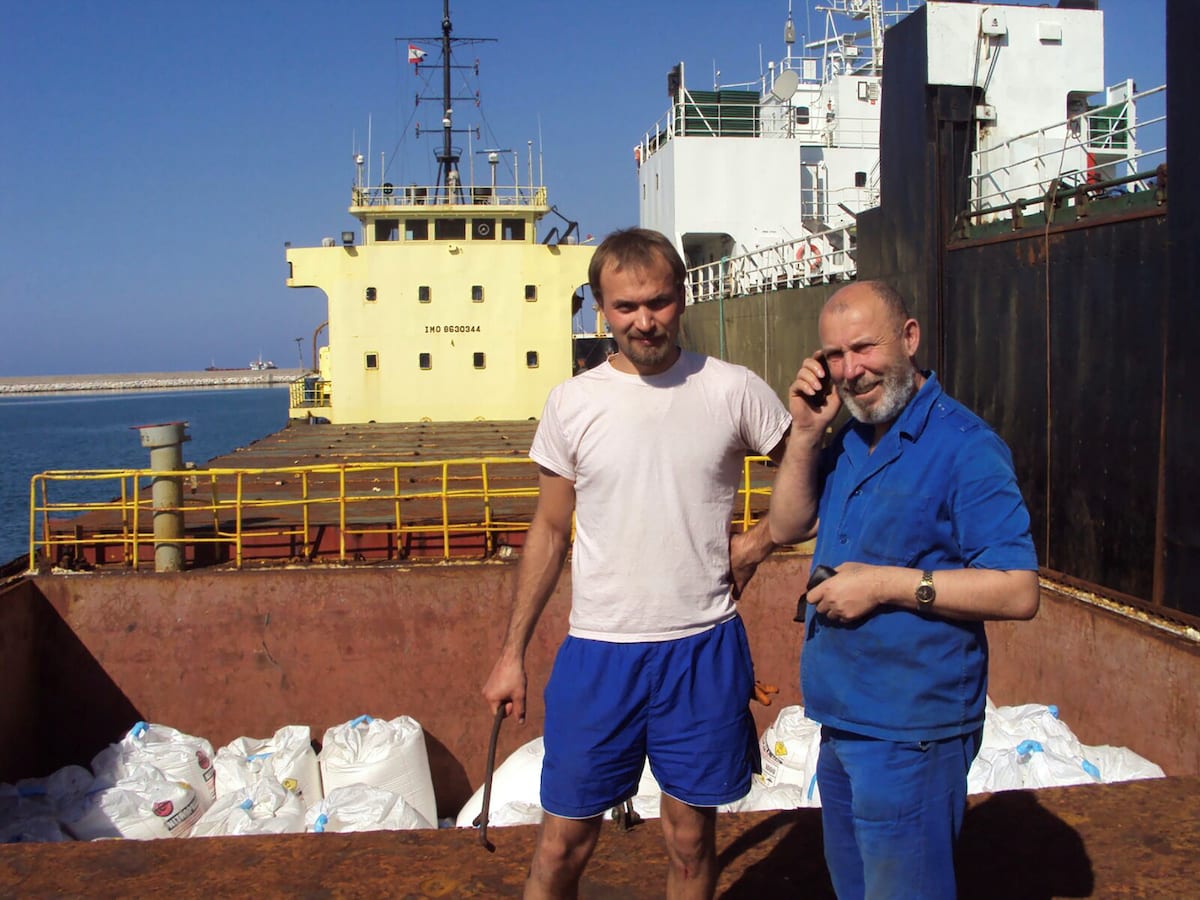The captain of cargo vessel Rhosus, and boatswain Boris Musinchak (right), pose next to the ammonium nitrate cargo in the port of Beirut, Lebanon, in a summer 2014 photograph. Picture taken in summer 2014. REUTERS/Personal archives of Boris Musinchak

By Maayan Lubell, Rami Ayyub and Katharine Houreld Aug 7 (Reuters) – The devastating explosion in Beirut should be a wake-up call for countries on the dangers of ammonium nitrate, which caused the blast, experts say.
Lebanese authorities said 2,750 tonnes of the industrial chemical had been stored for six years at Beirut port without safety measures. That stockpile exploded on Tuesday, killing more than 150 people, injuring thousands and leaving about a quarter of a million people homeless.
Commonly used in fertilizers and as an industrial explosive, ammonium nitrate is considered relatively safe if handled properly, but it has proved lethal.
In one of the world’s deadliest industrial accidents, 567 people were killed in Texas in 1947 when 2,300 tonnes of ammonium nitrate detonated aboard a ship.
“Beirut, like Texas, is a wake-up call. We should learn from these catastrophes and make sure they don’t happen again,” said Stewart Walker, of the school of Forensic, Environmental and Analytical Chemistry at Flinders University in Adelaide.
Some countries have banned ammonium nitrate as a fertilizer because it has been used by militant bomb-makers and since Tuesday’s blast, some governments have been urged to relocate stockpiles.
Chris Owen, a U.N. explosives adviser, said few countries make ammonium nitrate but many use it, often importing it by sea. Since many ports have had cities develop around them, large quantities are moving through cities on a regular basis. “If it’s managed properly, it’s no risk,” Owen said.
Beirut’s Accidental Cargo: How an Unscheduled Port Visit Led to Disaster
In terms of safety, experts say, quantity, ventilation and proximity to flammables are critical, as is distance from population centers.
Anger has been mounting in Lebanon at the authorities for allowing huge quantities of the chemical to be stored near a residential area for years in unsafe conditions.
The United Nations has issued guidelines on safe storage and transportation but regulations vary from country to country, experts said.
Global variation on regulation is a concern, said Julia Meehan, the managing editor of ICIS Fertilizers, a trade publication. “There’s no global body that looks across it, it’s country to country or regional,” said Meehan. “It can even differ from port to port.”
One expert, who asked not to be identified, said political instability was a major factor in enforcement. He cited Lebanon, Syria, Afghanistan and South American countries. “If the country is at war, or struggling with an insurgency or other problems, they have other issues to deal with,” he said.
Global data on storage is spotty, said Hans Reuvers, a German-based expert on ammonium nitrate and fertilizer technology and executive committee member at the Ammonium Nitrate/Nitric Acid Producers Study Group (ANNA).
Germany only allows 25 tonnes of pure ammonium nitrate to be stored in one place, Reuvers said. France toughened its regulations after a 2001 explosion in Toulouse killed 31 people.
“You have to store it in non-flammable bins, keep them far away from flammable materials. There are similar regulations across Europe as well as in East Asia,” Reuvers said.
GLOBAL TRADE
Worldwide trade in ammonium nitrate in 2018 was worth $2.14 billion, with Russia the leading exporter, according to the Observatory of Economic Complexity, and Brazil the largest importer.
The United States and Europe are the leading consumers of ammonium nitrates, according to London-based IHS Markit, accounting for just over half of global consumption in 2019.
Countries with large stockpiles tend to have large mining or industrial agriculture industries, said Roger Read, of the School of Chemistry at the University of New South Wales.
“Those would tend to be most large, industrialized countries – Britain, the U.S., Russia, China – as well as India and other smaller countries in Europe,” Read said.
The United States in 2019 eased chemical-safety regulations implemented after a deadly ammonium nitrate blast in 2013. The move cut costly regulations but still kept safety measures, according to the Environmental Protection Agency (EPA).
Rick Engler, a former member of the U.S. Chemical Safety Board, said the EPA should add ammonium nitrate to a list of regulated chemicals needing increased oversight, calling present U.S. regulations “thoroughly inadequate.”
The United States does not maintain a public database on the locations of ammonium nitrate, meaning people do not know if they live near one, said Elena Craft, of the Environmental Defense Fund advocacy group.
“There are a lot of unknowns about how much of this material exists and where,” Craft said. “You don’t know the magnitude of that risk because of the lack of information that’s available.”
(Additional reporting by Caroline Stauffer, Tangi Salaun, Jonathan Saul, Gus Trompiz, Polina Devitt, Guy Faulconbridge, Josephine Mason, Stephen Farrell, Tom Polansek and Sudarshan Varadhan; Writing by Maayan Lubell; Editing by Stephen Farrell and Giles Elgood)
(c) Copyright Thomson Reuters 2020.

 Join The Club
Join The Club











